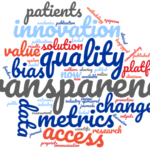Featuring a new addition to the network of institutions sharing neuroscience data, the obstacles to data sharing, and the use of QR codes for preprints.
The Neuro joins the Canadian Open Neuroscience Platform via The McGill Tribune
Earlier this week, it was announced that McGill University and its partners in the Montreal Neurological Institute and Hospital, known as the Neuro, had joined the network of organizations that contribute to the Canadian Open Neuroscience Platform or CONP. They will link up with the many institutions from both inside and outside Canada (including the University of Toronto, the University of Oxford and Johns Hopkins University) that use this platform to provide access to neuroscience research data to others within the partnership.
How do peer reviewers receive recognition? via Scholastica
Peer reviewers are increasingly being officially recognized for their hard work safeguarding the scientific cannon – but how? This article gives a short overview of four key ways in which reviewers are being acknowledged: via ORCID iDs, Publons reviewer profiles and awards, publisher-specific programmes or even just thank you notes.
What are the obstacles to data sharing? via Springer Nature
This white paper reports on a survey of over 7700 researchers from all over the world, looking at how the rates of data sharing vary by region, subject and seniority. The paper also breaks down attitudes towards data sharing held by these different groups. The survey finds that organizing data in a useful way was the most common challenge for researchers when sharing their data, and that small data sets are the least likely to be shared.
Generate a QR code for your preprint! via bioRxiv
bioRxiv has announced the launch of a new service that enables authors who are preprinting their articles to generate QR codes that direct people to their research quickly and easily. Going forward, all newly submitted preprints will have one of these QR codes generated automatically; QR codes for older preprints can be generated via the website provided above. The QR codes have been developed to enable researchers presenting at conferences to provide a quick link to the papers associated with their posters or oral presentations.






